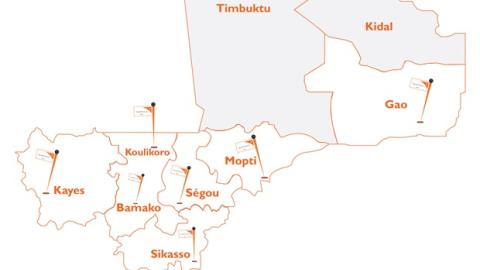
Our Work
HOW WE WORK
In Mali, World Vision uses a community-based approach. Our teams work closely with children, households, communities, local authorities and partners. We listen to families, understand their issues and empower communities with skills and resources that bring lasting change for children.
We serve the most vulnerable children and families through a multi-sector programmatic approach focused on: health and nutrition, Water, Sanitation and Hygiene, education and life skills, food security and resilience, advocacy, and child protection and participation.
ISSUES WE CARE ABOUT
HEALTH AND NUTRITION
Poor nutrition, lack of clean water, and high rates of preventable diseases are all factors that contribute to the health and nutrition challenges in Mali. World vision is working in collaboration with the Ministry of Health, Civil Society members and communities to address the primary causes of maternal, neonatal and child mortality. We use well-established project models like Community-Based Management of Acute Malnutrition, Early Child Development and the 7-11 Strategy for Maternal and Child health which consists of seven interventions for mothers and 11 for children focusing on exclusive breastfeeding, full immunization, adequate diet, preventing malaria (chemoprevention treatment to children under five) and other infectious diseases, facilitating access to health service and hygiene practices through sustainable health promotion & prevention and behaviour change communications.
EDUCATION
Quality of education, access to education and governance remain the key challenges for Education in Mali. In response, World Vision strategy is focused on improving quality of primary education (children are able to read with comprehension after six years at school), increasing equitable access to schooling for boys and girls, supporting adolescents to be ready for economic opportunities, increasing capacity of communities and to hold accountable those responsible of education services. While constructing schools, World Vision emphasizes on community engagement, partnering for change, and the capacity building of government and private actors including teachers, headmasters, directors of Pedagogical Animation Centres and staff with regard to teaching approaches and measurement tools on reading skills.
PROTECTION, CHILD PARTICIPATION AND GENDER
Poverty and cultural and religious customs expose children to issues such as begging, early marriage and pregnancy, female genital mutilation, child labour and trafficking and lack of official birth documentation. In Mali, 19% of children under 5 are not registered at their birth; 3 million (70%) children between the age of 5 and 17 years are involved in child labour of which 80% are harmful works; 61% of women get married before 18 years old; around 69% of girls between 0-10 years old and 83% between 10-14 years old are mutilated. This is why World Vision is working to strengthen both the protective environment for children as well as building the capacities of children themselves to improve their well-being and fulfil their rights to protection and to establish an evidence base for advocacy efforts at national, regional and global levels. Word Vision work also increases child participation as well as gender inclusion by reinforcing response community systems and structures.
FOOD SECURITY AND RESILENCE
Agriculture is still the main source of income for more than 70% of the population in Mali; but climate changes and permanent population movement in the productive regions affect food production. World Vison is working with communities to improve livelihood (Agriculture and economic development), resilience to chocks and early recovery. Thus community members are strengthened to develop sustainable food production, conservation approaches, soil fertility restoration, disaster management and prevention, and develop environmental protection programmes.
WATER, SANITATION AND HYGIENE
WASH sector in Mali remains a great concern and raises many issues in rural communities, semi-rural and urban areas. For World Vision Mali, access to safe water, hygiene and sanitation reduces poverty and contributes to the well-being of children. It improves people's health by reducing the incidence of water borne diseases, these last being one of the main causes of death among children population. Having access to reliable water in quantity in a community increases food production and opens many possibilities for women to generate income. It also builds community resilience and increases children’s access and attendance to school. It brings the family together and restores their communities. It’s in this light that World Vision Mali is constructing water infrastructures such as wells and water systems combined with sanitation facilities and approaches using Community Led Total Sanitation and hygiene promotion targeting communities, schools and health centres.
EMERGENCY RESPONSE
World Vision Mali is providing support to victims of the conflict in northern Mali since 2012. Thus, World Vision opened an office in Mopti in 2013 and two secondary offices were opened in Douentza and Gao in 2014. We provided assistance in terms of food distribution, nutrition, protection, education, non-food items distribution and economic development to more than 150,000 people returnees and vulnerable households in northern Mali as well as Internally Displaced People in Bamako.